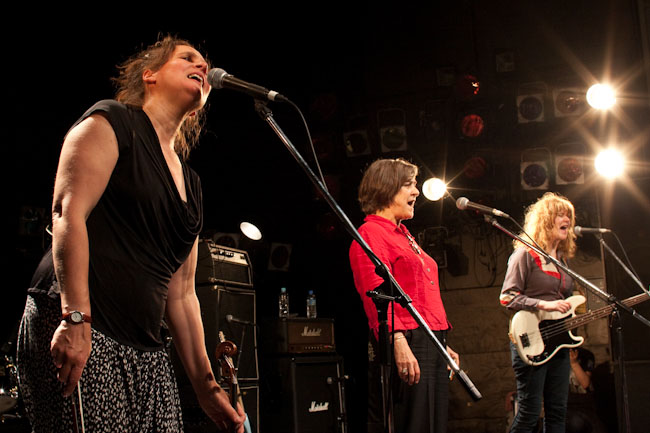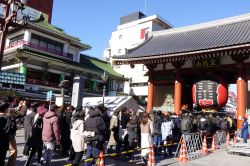
Originally published on metropolis.co.jp on June 2010

Photo by James Hadfield
Well, there was never much risk of The Raincoats getting too slick. Thirty-odd years after first picking up instruments, Ana da Silva and Gina Birch are still apparently figuring how to play them. One of the strangest sights during the opening gig of their first ever Japan tour is that of violinist Anne Wood standing behind da Silva, playing the right hand of her guitar part for her.
The Raincoats preempted the current vogue for revival tours by a good decade. Since reforming in 1993, spurred on by the attention of acolytes including Kurt Cobain, the band have muddled along with occasional gigs and a well-received comeback album. Still, this year has been their most active for a while. The current tour was preceded by a handful of UK shows, including both the Matt Groening and Pavement-curated editions of All Tomorrow’s Parties.
Based on tonight’s evidence—and I mean this in the nicest possible way when—they’re every bit as ordinary as they ever were. Starting with stone-cold pop classic “No Side to Fall In,” the ladies (joined by drummer Jean-Marc Butty) tap straight back into the vital amateurishness that made their original records so endearing. Perhaps the only thing that’s aged is the repartee: the inter-song banter is now of the toe-curling “Oh, mum…” variety, as when Birch introduces “Babydog” by grumbling about how her kids don’t take care of the pet cats she got for them.
Most of this goes over the audience’s head, which isn’t always a bad thing. “You have a long tradition of ending it all here,” cracks Birch as she introduces “57 Ways to End it All,” which could’ve been a real tumbleweed moment if more than a fraction of the people here had understood it.
The set includes almost all of their eponymous 1979 debut—only “Off Duty Trip” and “Life on the Line” don’t make the cut—but it’s the later material that is often most revelatory. While everybody remembers the pop numbers, The Raincoats’ subsequent forays into more exploratory territories might almost be mistaken for a primitive template for post-rock. The fiddly, sinister “Only Loved at Night” gets a welcome re-airing (you can see why da Silva ended up working with This Heat drummer Charles Hayward), while the ferocious 1996 B-side “I Keep Walking” is a particular standout.
Da Silva screws up the intro to set closer “Black & White”—”We did it this afternoon but, you know…”—and they segue straight into the encore without so much as exiting the stage. When the crowd bays for more, da Silva returns and explains that they haven’t practiced any others, but “we can do the same songs.” And then they proceed to do exactly that.








